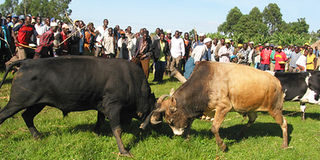Bullfighting re-examined after woman’s death, fight among fans

Dr Boni Khalwale has been the face of cattle regularly locking horns in Ikolomani constituency. Photo/FILE
The bullfighting fraternity in Kakamega County is in shock after rival supporters who had turned up to cheer their favourite animals at the Muranda grounds attacked each other and damaged property.
Several people were injured on Friday last week in the incident in Kakamega East sub-county.
The windscreens of a vehicle belonging to one of the bullfighting fans were smashed in the fracas that erupted after the match between the two bulls – Ringo and Nandi – ended.
Ringo is the reigning champion in the region but Nandi carried the day in the charged match that ended in acrimony.
The incident has ignited debate about preparations, safety measures and arrangements put in place during charged bullfighting contests.
In a separate incident, a 60-year-old woman from Lutoto village was trampled to death by a bull after a match.
The bull is reported to have charged at the woman and gored her to death as she headed home with two other women.
The owner of the bull was arrested and will face charges of negligence in handling the bull.
Mr Bonventure Munanga, an official with the Kakamega Bullfighting Association, described the incident at Muranda as unacceptable.
Kakamega East sub-county Police Commander Robert Makau said no arrests had been made as the incident had not been reported to the police.
“If we fail to intervene and stop the violence during bullfighting matches, this could result in the sport being banned. Such a move would have catastrophic consequences on the community, which has a strong attachment to bullfighting as an integral cultural activity in our region. We don’t want that to happen,” said Mr Munanga.
Owners of bulls from Ikolomani and Shinyalu have been invited to attend a meeting organised by officials of the Kakamega Bullfighters Association to restore order and draw up regulations to govern the conduct of the sport.
“We want to ensure that all those whose bulls participate in the matches adhere to the regulations. The violence we are witnessing in the matches is unacceptable,” Mr Munanga said.
“Bullfighting is a sport that unites communities and when violence creeps in, that spells doom for the future of one of our revered cultural activities.”
Prospects of a ban on bullfighting activities in the region have brought back memories of how the sport was nearly crippled by the Covid-19 pandemic in 2021.
For the bullfighting fraternity in Western Kenya, 2021 was one of the most uneventful and frustrating periods in the history of the popular communal sport.
Isikuti
The pulsating beats of the isukuti drums and the frenetic crowds cheering the bulls as they battled in the open grounds and gored each other were suddenly halted.
From the Malinya grounds in Ikolomani constituency to Shinyalu, Lurambi, Malava and Matungu, owners of bulls were thrown into a stupor as they struggled to come to terms with the move to stop bullfighting activities in the region.
The Covid-19 pandemic dealt a blow to one of the most popular sporting events that draws huge crowds on market days and weekends.
The bullfighting contests are usually announced by the throbbing beat of the isukuti drums and the accompanying clanking metal sounds played by dancers.
But during the pandemic, the fanfare and usual celebrations associated with the contests were brought to an abrupt halt by Covid-19 restrictions.
The authorities swung into action and issued directives to organisers to stop the activities.
In villages, a deathly silence hung in the air as if signalling the end of the bullfighting craze that used to erupt with ecstatic bustle as the champion bulls locked horns in a life-and-death tussle.
Owners of bulls that take part in the fights were distraught and they struggled to tame the ferocious animals at their homes.
Mr Munanga explained: “The bulls are usually fed and groomed to fight and keeping them at home makes the animals restless and ferocious.
“The animals started attacking the owners and family members because they were not being taken to the fields to take part in the fights.”
The caged bulls were restless and attacked anybody who went close to them, forcing the owners to come up with a new strategy to tame them.
“Things became very tough for the owners of the bullfighters as Covid-19 infections spread in villages, forcing the tightening of restrictions to avoid crowding in public places,” said Mr Munanga.
One of the things the bullfighters did was to arrange to take the bulls for a walk away from home early in the morning to calm the aggressiveness the animals were exhibiting after being enclosed in a cage for a long time without much activity.
Some bull owners had to take the animals to knock down anthills in a mock fight as a way of calming them.
But these were short-term measures as pressure was piling from villagers for the bullfighting contests to resume.





